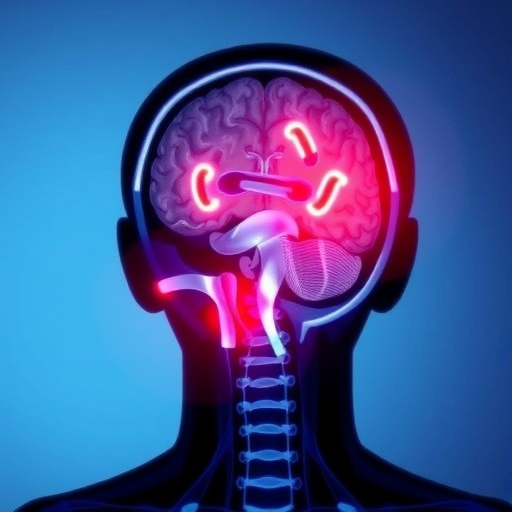In the evolving landscape of neuroscience, a significant challenge arises following acute brain injury, where patients often experience a complex array of symptoms collectively termed Neurogenic Organ Dysfunction Syndrome (NODS). This multifaceted condition, which has been a focal point for researchers, indicates that the ramifications of a brain injury extend far beyond the head, influencing various organ systems throughout the body. A recent study led by Zhang et al. propels this discussion forward, providing insights that could reshape our understanding and management of NODS in military and civilian medical practices.
At first glance, it might appear peculiar to draw connections between brain trauma and systemic organ dysfunction. However, the interactions between neural and organ systems are intricate and well-documented. Following brain injuries, particularly those classified as severe, patients can suffer from dysregulation of vital bodily functions. The manifestations of these dysfunctions include, but are not limited to, cardiovascular issues, respiratory distress, and even gastrointestinal problems. The study undertaken by Zhang and his colleagues emphasizes the urgency of recognizing and addressing these complications promptly.
Historically, medical thresholds have often categorized brain injuries distinctly from subsequent organ dysfunction. The perspectives within military medicine compel practitioners to consider a broader spectrum of care for severely injured soldiers. The psychological and physiological impacts of trauma in such settings are compounded by the battlefield environment, where rapid and often chaotic conditions impede standard therapeutic interventions. Zhang et al. argue for an integrated approach that encapsulates neurological status and systemic well-being, suggesting an interdisciplinary method to patient care.
In their research, the team scrutinized a cohort of patients who had suffered acute brain injuries under various circumstances, including accidents and combat-related incidents. They meticulously monitored the progression of neurological symptoms alongside changes in various organ systems. The integrative data garnered from this study attest to the complex interplay that exists between the brain and peripheral organs. This indicates that effective treatment protocols must include comprehensive monitoring of multiple organ systems to mitigate the risk of co-morbidities.
One pivotal finding from this research is the identification of biomarkers that may signal impending systemic dysfunction, providing clinicians with tools to forecast and, ideally, prevent organ failure. The frailty of the human body following significant trauma means that early intervention could be lifesaving. By recognizing the early signs of NODS, medical personnel may enact strategies that support not just survival but the quality of recovery. Educating teams to identify these biomarkers could be instrumental in improving outcomes for injured patients.
The implications of NODS extend beyond the immediate medical concerns into realms of rehabilitation. Patients recovering from brain injuries who also grapple with systemic dysfunction may face prolonged hospital stays, more intensive rehabilitation requirements, and lower overall quality of life. Addressing both the neurological and systemic ramifications can streamline recovery, reduce healthcare costs, and enhance readjustment to daily life post-injury.
Furthermore, the importance of mental health cannot be overstated. Soldiers returning from combat with injuries often experience not only physical challenges but also profound psychological effects. Integrating psychological support into the treatment of NODS leads to a holistic approach that recognizes the human experience is multidimensional. It is paramount that healthcare providers develop comprehensive frameworks that consider the psychological ramifications of injuries and facilitate a robust support network for recovery.
Zhang et al. have illuminated the path for future research endeavors. Their study paves the way for further investigations that could refine intervention methodologies and expand the knowledge surrounding the early identification of NODS. The evolution of treatment strategies may hinge on a better understanding of how neurogenic pathways affect peripheral organ systems and vice versa.
In the context of military medicine, the findings underscore a compelling need for training that emphasizes interdisciplinary collaboration among neurologists, internal medicine specialists, and rehabilitation experts. This paradigm shift in patient care encourages a team-based approach, advancing protocols that could redefine standards across military and civilian healthcare settings.
As researchers, clinicians, and practitioners delve deeper into the implications of Zhang et al.’s findings, the hope is to foster a systematic change in how acute brain injuries are understood and treated. Establishing a culture of vigilance for systemic dysfunction following brain trauma creates opportunities for more rapid intervention, enhancing patient mortality rates and overall health outcomes.
This study not only highlights the critical connections between brain health and organ functionality but also creates a rigorous challenge to existing therapeutic frameworks. A dynamic response to brain trauma emerges as essential to mitigate the consequences of neurogenic issues on the broader spectrum of human health. As scientific inquiry continues to unveil the complexities of NODS, the medical community stands on the precipice of pioneering advancements that could position it at the forefront of transformative care.
Ultimately, awareness and education will serve as fundamental pillars in addressing Neurogenic Organ Dysfunction Syndrome. By fostering an understanding of its nuances and fostering collaborations across specialties, it is conceivable to enhance the quality of care and recovery for those afflicted by acute brain injuries. Zhang et al.’s research represents not just a study but a clarion call for a more integrated approach to trauma care—one that acknowledges the interconnectedness of every organ system in the intricate web of human health.
Through the lens of Zhang et al.’s findings, we can envision a future where military and civilian medical practices converge on a unified understanding of brain injuries, leading to optimized outcomes for patients nationwide.
Subject of Research: Neurogenic Organ Dysfunction Syndrome (NODS) after Acute Brain Injury
Article Title: Neurogenic organ dysfunction syndrome after acute brain injury
Article References:
Zhang, H., Chen, WJ., Chao, YG. et al. Neurogenic organ dysfunction syndrome after acute brain injury.
Military Med Res 12, 77 (2025). https://doi.org/10.1186/s40779-025-00662-8
Image Credits: AI Generated
DOI: https://doi.org/10.1186/s40779-025-00662-8
Keywords: Neurogenic Organ Dysfunction Syndrome, Acute Brain Injury, Systemic Dysfunction, Military Medicine, Patient Care, Holistic Approach, Biomarkers.




